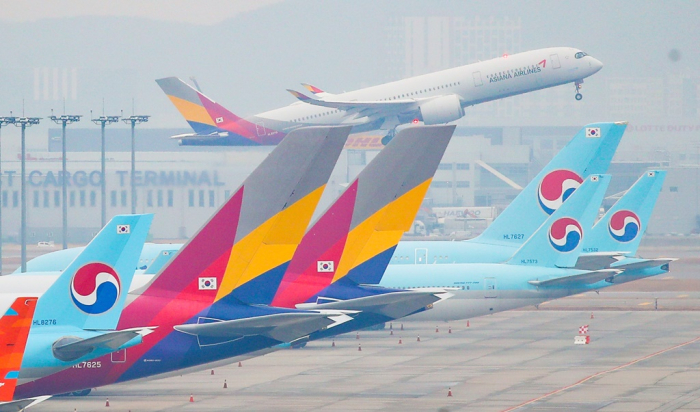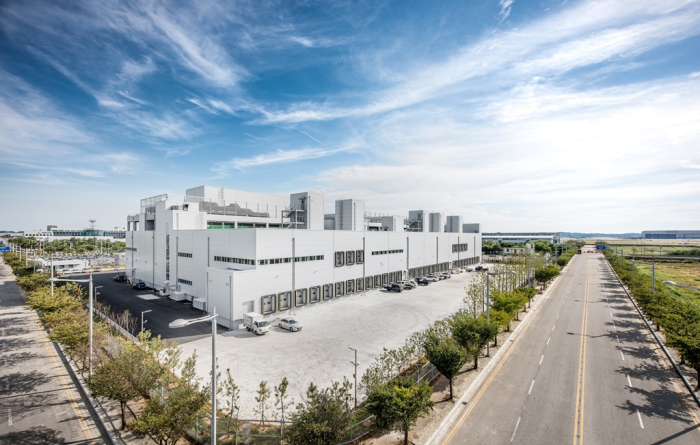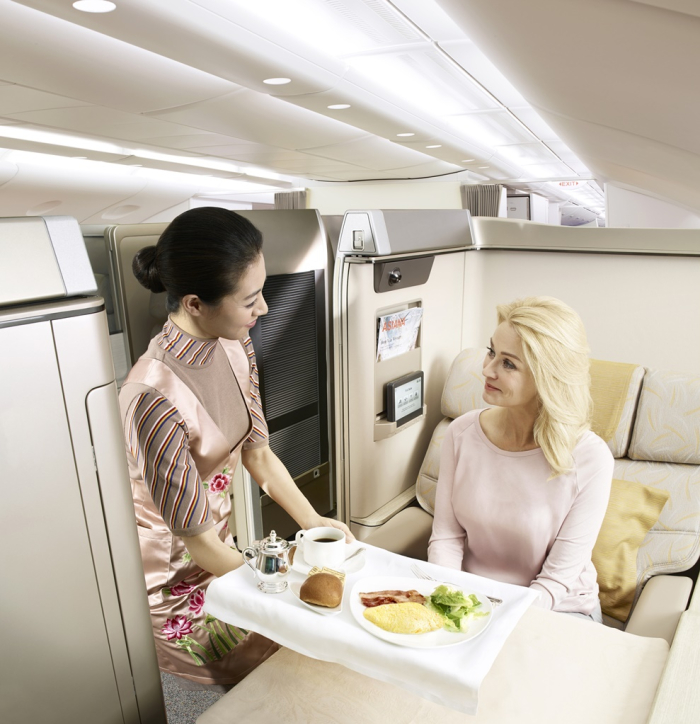Airlines
Kumho Asiana assures 30-year profits to Gate Gourmet in catering deal
Korean Air may have to prepare hundreds of millions of dollars in provisions to assume the loss
By Oct 12, 2021 (Gmt+09:00)
5
Min read
Most Read
Samsung shifts to emergency mode with 6-day work week for executives


CJ CheilJedang to sell feed, livestock unit for $1.4 bn


Samsung Electronics' key M&A man returns; big deals in the offing


Affinity to buy SK Rent-a-Car at $572 mn, more deals expected


Keppel REIT to sell Seoul-based prime office T Tower



Kumho Asiana GroupŌĆÖs management assured net profits for 30 years to Gate Gourmet when the South Korean conglomerate signed a deal for Asiana Airlines Inc.ŌĆÖs in-flight meals with the airline catering company.
Such an unusual guarantee of future profits was expected to ramp up losses of South KoreaŌĆÖs No. 2 airline to hundreds of millions of dollars that the countryŌĆÖs leader Korean Air Lines Co. will have to assume given its plan for the acquisition of the smaller rival.
The groupŌĆÖs management including the former chairman Park Sam-koo agreed that Asiana will guarantee net profits in 2016 when they signed the deal with Gate Gourmet, prosecution and industry sources told The Korea Economic Daily on Oct. 12.
AT LEAST $308 MILLION LOSSES FROM 30-YEAR PROFIT GUARANTEE
The agreement was revealed in 2019 when Gate Gourmet Korea, a joint venture between Gate Gourmet Switzerland and Asiana, filed an arbitration suit against the airline in the International Chamber of Commerce in Singapore to request payments of the guaranteed net profits.
The ICC ruled Asiana must pay 42.4 billion won ($35.4 million), including the difference between the paid amount and the guaranteed profits for the first two years under the agreement, as well as damages from the delayed payment. South KoreaŌĆÖs prosecution estimated Asiana to suffer at least 370 billion won ($308.3 million) in losses in the 30 years.
Kumho Asiana was known to have agreed to make a compulsory payment to Gate Gourmet every year if Asiana carries a certain number of passengers. The profit guarantee was also understood to have included a clause for compensation of a certain amount of money if the number of passengers does not meet the level.
The ICC made the ruling because the organization recognized a ŌĆśpackage dealŌĆÖ between the Kumho AsianaŌĆÖs management and Gate Gourmet, sources analyzed. The group has been suspected of signing the in-flight meal supply contract on the condition of the catering companyŌĆÖs acquisition of 20-year bond with warrant (BW) without interest worth 160 billion won issued by Kumho Holdings (currently Kumho Buslines), the groupŌĆÖs holding company, in 2016.

The group management intentionally excluded AsianaŌĆÖs executives during the talks for the supply contract and it did not report the assurance of the net profits to the carrierŌĆÖs board of directors.
Prosecutors confirmed that the deal was signed without AsianaŌĆÖs executives such as a former president Kim Soo-cheon at the time, deciding not to indict Asiana and clearing Kim of the charges.
Korean Air, which agreed to take over Asiana for 1.8 trillion won last year to create the worldŌĆÖs seventh-largest airline, was keeping an eye on the impact of the profit guarantee since the South KoreaŌĆÖs top carrier is supposed to assume losses of the competitor after the merger.
TO REBUILD KUMHO GROUP
Kumho Asiana sought the profit guarantee in a bid to rebuild Kumho Group in 2015. The group management had planned to re-acquire shares in Kumho Industrial, AsianaŌĆÖs largest stakeholder, to restore the lost control during the debt workout program. AsianaŌĆÖs in-flight meal business emerged as a key source of funds for the plan.
In 2016, about two years before the expiration of an in-flight meal supply contract with LSG Sky Chefs, a subsidiary of German airline Lufthansa, the group proposed to sign a new deal with catering companies including the old supplier that provides financial supports to Kumho Holdings.
Gate Gourmet accepted the proposal by acquiring the 20-year BW worth 160 billion won. Based on the deal, both companies established Gate Gourmet Korea, a joint venture. The group management guaranteed definitive profits when they were in talks for the deal.
AsianaŌĆÖs executives and board of directors were not aware of the guarantee since they were excluded during the process for the catering and BW deals.
ŌĆ£That was a simple deal to change a contractor that was not related with the BW deal at all,ŌĆØ the group explained to the board of directors. The profit guarantee has not been reported in the minutes of the board meetings.

Gate Gourmet requested Asiana to pay profits as assured, but the airlineŌĆÖs executives rejected the request since they were not aware of the agreement. Gate Gourmet Korea brought the issue to the ICC in Singapore in June 2019. The ICC in February this year ruled in favor of Gate Gourmet Korea, seeing the BW deal and the catering contract as a package. The organization was said to have recognized the guaranteed profits from the meal supply contract as a benefit from the BW it acquired without interest.
KOREAN AIR NOT TO BREAK ACQUISITION DEAL
The ruling is unlikely to become a factor to break Korean AirŌĆÖs agreement to take over Asiana since the arbitration case was filed before they agreed on the merger. Still, the decision was known to have surprised both of the carriers since it was a ŌĆ£perfectŌĆØ victory for Gate Gourmet.
It is not easy to ask Kumho Asiana to take more responsibility since Korean Air is slated to buy new shares issued by Asiana, not existing shares held by the group. Korean Air is expected to prepare steps, closely watching AsianaŌĆÖs countermeasures.
ŌĆ£It will be impossible to invalidate the (acquisition) deal since they already set the merger price and the issue was a risk that could be grasped in the acquisition process,ŌĆØ said a source familiar with the two airlines. ŌĆ£If the ongoing criminal cases against Kumho group executives clarify the guarantee was agreed without Asiana AirlinesŌĆÖ consent, they can argue the agreement is invalid.ŌĆØ
Write to Jun-ho Cha and Hyo-Joo Ahn at chacha@hankyung.com
Jongwoo Cheon edited this article.
More to Read
-
 Rights offeringKorean Air kicks off biggest-ever rights offer to finance Asiana takeover
Rights offeringKorean Air kicks off biggest-ever rights offer to finance Asiana takeoverFeb 22, 2021 (Gmt+09:00)
3 Min read -
 AirlinesKorean Air to buy rival Asiana in $1.6 bn deal to emerge as worldŌĆÖs 7th airline
AirlinesKorean Air to buy rival Asiana in $1.6 bn deal to emerge as worldŌĆÖs 7th airlineNov 16, 2020 (Gmt+09:00)
5 Min read
Comment 0
LOG IN


